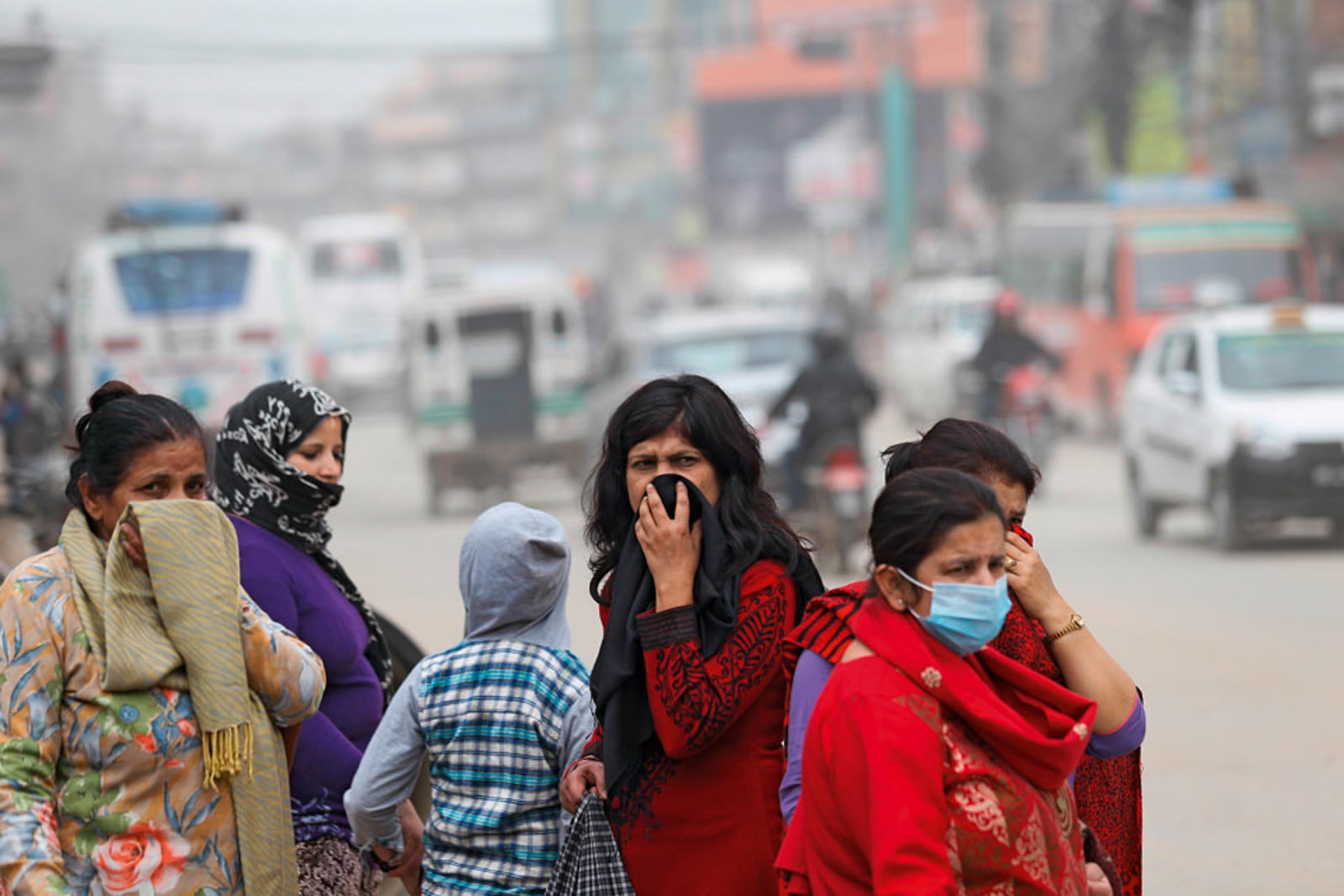15 years – passed like a bumpy economy flight from Germany to Nepal. Here, Helge Timmerberg searches for the yogi who took away his fear in the Himalayas. You can read how the journey begins here, and how to get rid of your fear in Timmerberg’s new book “Das Mantra gegen die Angst oder Ready for everything”.
It’s 6.30 a.m. I didn’t sleep for two nights. I’m not in shape for the entry formalities. I can feel the sweat on my forehead at the visa machine. You can get the visa either at the Nepalese embassy in your home country or here. I used to think it would be quicker here, but I no longer believe that. I stand in front of the computer and enter the data he asks me for. He demands too much. The address of the hotel? I don’t have a hotel. I live with Scarlett. However, I don’t have your address either. And no telephone number. I only have one e-mail exchange with her, which was torn off three days ago. She sent me a driver because addresses are useless in Kathmandu, she wrote, and that was the last state of affairs. She was in London and wanted to leave two days before me. I haven’t heard from her since then. Maybe she didn’t fly at all, maybe she didn’t find her house in Kathmandu again or found it completely different than when she left it months ago, maybe she doesn’t feel like seeing me anymore or visiting in general, she’s an Aquarius, like me, with us you rarely know what’s going to happen next. There is no box on the monitor of the visacomputer for answers like these and no way to formulate them. The queue grows behind me.
Give up. How nice it would be to just turn around and go home. I’m too old for this shit and for the shit to come. Flood disaster in the south, 1,800 dead, roads washed away, half of Nepal without medical care, a country in a state of emergency, only Kathmandu is still functioning halfway normally, but that is no consolation either, because normal means normal here: Traffic jams, smog, mud and puddles. And lots of accidents. Writes our Federal Foreign Office. It is recommended to avoid Nepal at the moment or only travel to Kathmandu if it is really necessary. How compelling is the mantra against fear? How compelling is the Yogi Kashinath? How compelling is my departure into freedom? How compelling is my next book? And how compelling is the moment? Should I step aside, sit in some corner and cry until the cleaning lady sweeps me outside?
What do they actually do with the visas? What do they hope to gain from this? More information, more control, more security? I don’t think they give a damn about any of that. They want money. And I’m happy to give it to one of the poorest countries in the world, even without the stress at the ATM or in the embassies, just like that, 40 dollars for 30 days, cash on paw and namaste. What hurts less? Corruption or bureaucracy? Devil or Beelzebub? Terror or anarchy? “You have to look at each individual case,” says my new friend. I meet him when I’ve finished everything and am standing in front of the airport. Friend is of course an exaggeration, companion in destiny is right. His driver, like mine, didn’t show up. His, because his car broke down on the way to the airport and a new one has to be organized first, I don’t know anything about my driver. No name, no number, and I don’t know what he knows about me if he does come. Did Scarlett give him a sign with my name on it? And if so, which one? Helge? Tim? My family name? Does she even know him? Or did she just tell him that the guy looks like Jesus, but fatter?
The weather: no rain, but no sun either and no view, however fleeting, of the peaks of the Himalayas. The mountains are above the clouds, below them I can see cab scrap in the pale morning light, a wet roadway, and from the other side of the road a lot of clay begins. If I had landed on a field, it would look similar. After all the other passengers had somehow been picked up and rolled off, there was only me and this well-dressed gentleman with the friendly eyes left, and so we got talking. He is Nepali, lives in Washington, and his industry is “energy”. It electrifies the dark spots of the earth. Sometimes in Pakistan, sometimes in Cuba, sometimes here in Nepal. I don’t know yet, and perhaps I never will, whether as a scientist, engineer or manager, but he is resting in the comfort of business class. I don’t rest there. I am an economy writer. But still.
Whether big or small, old or young, clever or stupid, poor or rich, black or white, man or woman, capitalist, communist, anarchist or monarchist, believer or nihilist, coward or hero, it doesn’t matter, it’s always the same. Just like diesel. The fact that I write books gets people glowing, and as soon as they find out that I can make a living from it, their ignition kicks in. That is more than interest, even more than respect. That is love. Is that why I wanted to be a writer from an early age? Then I wasted my time. Those who cannot love themselves are like a black hole in which all light disappears. But the practical advantages of my profession are endless.
Cabs come by at almost regular intervals to pick us up, and there are also men standing next to us with cards in their hands that read “Pilgrims Inn” or “Buddha Lodge”. I no longer believe in Scarlett’s driver. However, I only believe in the promises of the cardboard to a limited extent. So I ask the Nepalese energy expert from Washington if he can take me to his hotel as soon as his car arrives, and he says yes. It will be a pleasure for him. And he wants to try to get me a room at a reduced rate, like him and the other participants at the energy conference he flew here for.
“Is this your first time in Nepal?” he asks.
“For the second time. Fifteen years ago, I traveled with a yogi in the Annapurna massif. As far as Muktinath.”
“Oh, I was in Muktinath too.”
“As a pilgrim?”
“No, we made the sacred springs useful. We piped the water so that it could drive turbines. Since then, the village has had electricity.”
And I wondered why the water under which Kashinath washed away his sins was gushing out of pipes. They protruded a few centimeters out of the mountain. And it looked a little unholy. “But they no longer need turbines today. They now have masts up there and are fully electrified. And there is also a road to Muktinath. Even a helicopter shuttle. You can fly directly from Pokhara to the springs. Is that what you want?”
“No, I just want to find the yogi again. He really fascinated me.”
“What was his philosophy?”
“I’m ready for everything.”
The Nepali smiles. I can understand that either way. To make sure he doesn’t think I’m gullible, I tell him, a) how I interpret this sentence and b) how the yogi was checked. To a: To be ready for anything means to have no more fear, and he who has no fear, not a single one, not even the tiniest one, is free, and he who is free has all the powers absorbed by fear at his free disposal. For example, to go even deeper into fearlessness. To b: At the end of our trek, we flew back from Jomson to Pokhara, and the plane almost crashed three times on its short flight. It was pretty blatant. The first time, some of the 30 or so passengers still laughed, the second time they didn’t, and the third time all hell broke loose. Panic. Everyone was screaming in agony, including me, only the yogi next to me remained as relaxed about everything as I had seen him for two weeks.
“Which airline was that?”
“Shangri-La Air.”
“But it really has crashed.”
“Yes, a year later. I saw the photos of the crashed plane in the newspapers. You can believe me, that was scary.”
His driver is there. The streets of Kathmandu described in the travel warnings of the Foreign Office are unfortunately worse than described. I don’t think this is due to the author’s lack of ability, but to the fact that they are indescribable. The hotel is about ten kilometers outside the metropolis, but we are still on the outskirts and not in the wilderness. On one of the city’s main traffic arteries, we struggle along at a snail’s pace on what is actually an impassable road, but everyone drives on it. All against one and one against all. “No rules,” says the driver. Everyone takes their chances, even though no one has any. Potholes, hollows, cross gullies and ditches follow one another with virtually no problem-free transitions, and all are filled with muddy water, you can’t see their depths. What remains of the great earthquake is now being devoured by the monsoon. I’m not at all surprised that the first car for my airport friend broke down, I’m just surprised that the second one is still running. The road is working tirelessly to ruin it, the shock absorbers are, it seems to me, already gone. It doesn’t shock me, it rather amuses me, but when I feel that my intervertebral discs are now the shock absorbers, I realize the seriousness of the situation. A new travel concept is needed. I can’t drive for long on these roads on my search for Kashinath. And don’t leave either. It’s not raining at the moment, but I almost wish it would so that the rain would wash the air clean. The windows of our small car are closed and the air conditioning is on, so I can’t smell the smog. I can only see it. That’s not nice. A world without light, and even the colors have lost out to the gray. The advertising signs of the stores, workshops and chai stalls no longer pop, the women’s saris have lost their magic, the colorful Asia is gone. The smile has also disappeared. Every second person wears a mask made of thin white fabric or has a scarf wrapped around their mouth and nose. And if you don’t, you look as sad as the woman we’re driving past, a young, beautiful woman with her baby in her arms. Maybe it’s her husband making her sad too, or someone has died, there are many reasons why a young mother can be in a bad mood, but to me that’s a smog face.
We drive over a bridge under which a dark river carries sewage and garbage, after which we are no longer in Kathmandu, and the road gets even worse, but also greener on both sides. There is a forest, it turns out that it belongs to the hotel. A barrier opens, a guard salutes. It goes uphill, the road becomes good, there is no longer any sign of the horror traffic. Only trees and orchids here and there. I knew it. My airport friend is a quality acquaintance. He leads me to exactly the place I need right now. The hotel has five stars and a ten-kilometer-long golf course.
“Namaste.”
The receptionist melts away with joy at being able to do her job. At the same time, the price of my room melts away. From 250 to 150 euros in a maximum of 60 seconds. But it’s in an outbuilding and some guests find it too far to get there. That’s why it’s cheaper. Is she talking about trekking? No, from about 200 meters. It will be a beautiful walk through the cultivated nature of the Himalayas at an altitude of 1400 meters. A few monkeys and the bellboy accompany me. But it’s not just the journey that’s worthwhile, the destination is too. A five-star travel writer’s room, with high walls, lots of windows, a large bed and a desk that could be used to write a book. All you have to do is take a seat and sentences emerge from the wood.
“May I smoke?” – “Of course, sir,” says the bellboy. Finally on the Internet, finally Scarlett. Two emails. The one from the day before yesterday she wrote in the transit hall in New Delhi and is of little help at the moment because she swears in it that the driver will be at the airport, but yesterday’s mail is closer to the truth. After an absence of three months, her house had received her in a total mess and it might be better if I took a hotel for the first night. “Call me.” And finally her phone number.








